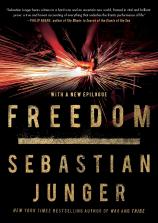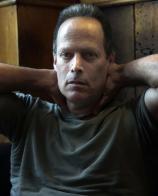Freedom
Review
Freedom
Whether it’s New England whaling crews or American soldiers waging war in Afghanistan, in books that include THE PERFECT STORM and WAR, Sebastian Junger has forged an estimable literary career telling the stories of people in extreme circumstances. His latest, FREEDOM --- composed of three brief essays that blend the account of a personal journey with historical, political and sociological commentary --- offers a thoughtful, but generally less compelling, experience.
Along with a cast of unidentified characters, some of whom are Afghan war veterans, he names “the Last Patrol,” FREEDOM describes Junger’s intermittent journey on foot over the course of a year from Washington, D.C. toward Pittsburgh, a distance of some 400 miles. (A portion of the trek was recorded in a 2014 HBO documentary.) Junger and his party mostly make their way as trespassers along railroad lines, occasionally dropping into one of the small towns on the route for a restaurant meal and respite from the trail.
Much of the journey Junger describes in FREEDOM takes place in territory just north and west of my home town of Harrisburg, Pennsylvania. The striking landscape of the region is defined by rolling hills, rich farmland, and rivers like the Susquehanna and one of its major tributaries, the Juniata, where the story begins.
"[FREEDOM is] composed of three brief essays that blend the account of a personal journey with historical, political and sociological commentary..."
Other than trying to evade the minimal risk of detection by railroad officials or police, and one incident when Junger and his companions wisely elected not to camp on what looked like a safe island in the middle of a river that turned out to be much less so after a night of heavy rain, there’s little drama inherent in this account.
As he describes it, each day was little more than “eat, walk, hide, sleep.” But movement on foot affords him ample opportunity to observe the slowly passing landscape, in all its rugged beauty, and he offers evocative descriptions, like one of “strips of woods along stream bottoms, windbreaks between the cornfields, ridges left wild for hunting” that sound almost Hemingwayesque.
Along the way, Junger turns away from the details of the trek to touch on a diverse collection of topics that include fragments of Native American history, the building of the 140,000 miles of the American railroad system, Chicago street gangs, Ireland’s Easter Rising in May 2016, and even something called the “Gini coefficient,” a measure of economic equality. Most of these subjects are inherently interesting, some even fascinating, but they seem to call for deeper treatment than he chooses to afford them in these pieces.
Junger employs this material as the point of departure for brief reflections on his ostensible subject, beginning with an elemental definition of the word in the isolation he and his companions experienced in the wilderness, observing that “most nights we were the only people in the world who knew where we were.”
The word freedom, Junger notes, “comes from vridom, which means ‘beloved’ in medieval German, and is thought to reflect the idea that only people in one’s immediate group were considered worthy of having rights or protection. Outsiders, on the other hand, could be tortured, enslaved, or killed at will. This was true throughout the world and for most of human history, and neither law nor religion nor common decency held otherwise.”
Junger observes that in modern democracies, unlike much of human history, “an ethos of public sacrifice is rarely needed because freedom and survival are more or less guaranteed.” And he admonishes those who believe that any sacrifice at all (he uses rationing water during a drought, but wearing masks during a pandemic seems like a more pertinent one) are forms of government tyranny. “They are no more forms of tyranny than rationing water on a lifeboat,” he writes. “The idea that we can enjoy the benefits of society while owing nothing in return is literally infantile. Only children owe nothing.”
In his final essay, “Think,” Junger acknowledges the connection between freedom and democracy, and the fragility of those twinned concepts. “At the heart of most stable governments is a willingness to share power with people you disagree with --- and may even hate,” he writes. Although he makes no specific connection to the turmoil following the 2020 US presidential election, he warns that “If democratic power-sharing is a potent form of freedom, accepting an election loss may be the ultimate demonstration of how free you want to be.”
By the time Junger --- 51 years old, with no children and in the process of getting divorced --- reaches Connellsville, in western Pennsylvania, he realizes it’s time to end his journey and “face my life.” His odyssey produces some insightful moments, but this account feels more like a set of sketches than a fully satisfying treatment of its subject. At the midpoint of his accomplished career, one hopes that someday Junger will choose to revisit it in a more expansive form.
Reviewed by Harvey Freedenberg on May 21, 2021
Freedom
- Publication Date: July 4, 2023
- Genres: Memoir, Nonfiction, Political Science
- Paperback: 176 pages
- Publisher: Simon & Schuster
- ISBN-10: 1982153423
- ISBN-13: 9781982153427




